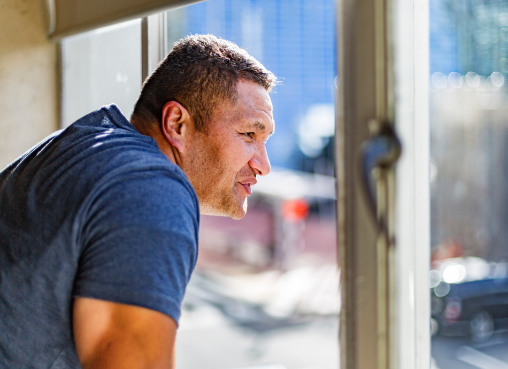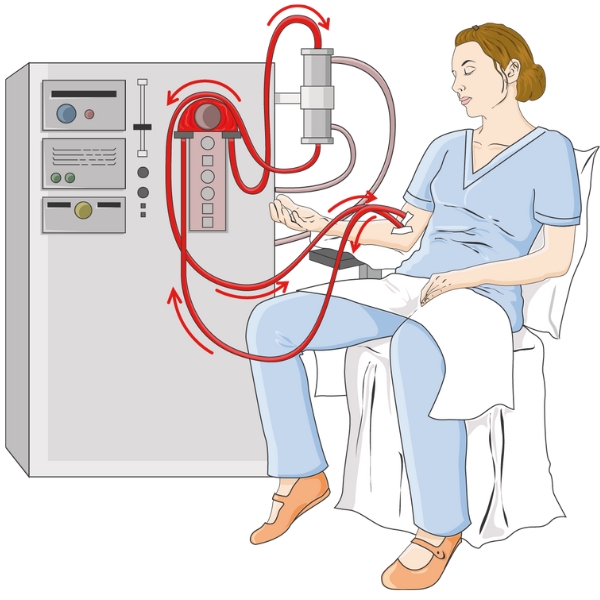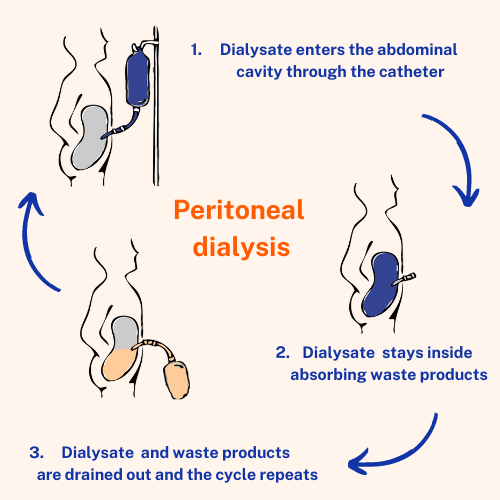You can now add Healthify as a preferred source on Google. Click here to see us when you search Google.
Dialysis
Key points about dialysis
- Dialysis is a treatment that’s used when your kidneys stop working properly, usually due to chronic kidney disease.
- It cleans your blood by filtering out waste products and fluid that your kidneys would usually get rid of as urine.
- While dialysis takes over some of the work of the kidneys it’s not as effective, and it isn’t a cure.

Dialysis cleans your blood by filtering out waste products and fluid that your kidneys would usually get rid of as urine. Without dialysis, waste products and excess fluid stay in your body, causing you to feel unwell, and you could die.
There are 2 types of dialysis – haemodialysis and peritoneal dialysis. The following videos from Kidney Health NZ explain the treatment options for chronic kidney disease. These include haemodialysis, peritoneal dialysis, transplantation and supportive care.
The videos can be found on this Kidney Health NZ resource page(external link) and are available in several languages (te reo Māori, Samoan, Tongan, Tuvaluan and Mandarin).
Haemodialysis (haemo means blood) is a type of dialysis used to treat kidney disease. With this treatment, the blood is filtered outside your body using a dialysis machine (also called a kidney machine). When you “go on the machine” needles connected to tubes are put into a special vein in your arm called a fistula (which is made by a small surgical operation).
The blood flows through these tubes out of your body into a filter (called a dialyser) attached to the dialysis machine and back into your body. Your blood goes round and round through the filter, just as it does with a normal kidney.
The filter cleans the blood and removes the excess water and wastes that your damaged kidneys can no longer manage. The fluid made by the filter goes directly down the drain, just like urine.

Image credit: Laboratoires Servier, CC BY-SA 3.0(external link) Wikimedia Commons
How often is haemodialysis done?
Most people go on the machine 3 times a week. You sit in a chair and are connected to the machine for 4 or 5 hours each time. Some people have dialysis more often and for a longer time.
Where is it done?
There are 3 places where you can have your dialysis treatment – at home (after being taught by hospital staff), at a satellite clinic or at the hospital.
Going on the machine at home makes it easier to continue normal life, but not everyone can manage dialysis on their own. The kidney team will discuss with you which place is best for you.
Peritoneal dialysis is another type of dialysis used to treat kidney disease. With this treatment your blood is cleaned inside your body, in the peritoneal cavity in your abdomen (belly). It’s a process you can manage yourself at home once your healthcare team has taught you how to do it.
Firstly, a minor surgical procedure is done to insert a catheter (a soft tube) through the wall of your belly and this stays in place. During treatment a bag of dialysis solution is attached to the catheter and it slowly fills up your peritoneal cavity. The bag is then detached and the solution stays in your belly. The fluid and waste products that would usually be filtered out by your kidneys are drawn out of your blood, across the peritoneal membrane, and into the dialysis solution (known as dialysate). After a few hours, an empty bag is attached to the catheter and the solution, fluid and waste products drain out of your belly and are thrown away.

Image credit: Nanoxyde (amended) via Wikimedia Commons(external link)
There are 2 options for peritoneal dialysis
- Continuous ambulatory peritoneal dialysis (CAPD): This where you do the process yourself 3 or 4 times a day, leaving the solution in your peritoneal cavity for several hours before draining it out. No machines are involved. You can leave the solution in your belly while you sleep so you don't have to wake during the night to attach or exchange bags.
- Automated peritoneal dialysis (APD): This is done at home, usually overnight, using a machine. You attach the catheter to the machine and it does the insertion and draining of the fluid for you.
Deciding which type of dialysis is best for you is something that you and your kidney doctor (nephrologist) will talk about together. Sometimes they may recommend the type they think will work best for you. This can depend on other medical conditions, family support and lifestyle factors.
Some people choose to do peritoneal dialysis because it can be done at home or at work, while others choose to do haemodialysis because they enjoy having 4 dialysis-free days.
There are advantages and disadvantages to both types of dialysis.
What are the advantages of haemodialysis?
- Usually 3 days a week, so some dialysis-free days.
- Can be performed in hospital by healthcare professionals.
- If you have a fistula, no external access between treatments.
What are the disadvantages of haemodialysis?
- You're restricted to a chair or bed for each treatment.
- It's a fixed schedule so you have to fit your life around treatments.
- There are fluid and some dietary restrictions.
- You have to make regular trips to the dialysis unit.
- It usually requires needles for each treatment.
What are the advantages of peritoneal dialysis?
- It's performed around your daily activities.
- It can be done overnight by a machine.
- You're usually able to drink more than if you are having haemodialysis.
- No needles are involved.
- It's easier to travel – you can take your supplies with you.
What are the disadvantages of peritoneal dialysis?
- You have a permanent catheter in your abdomen.
- There's a higher risk of infection (peritonitis) due to the frequency of treatment.
- It can feel uncomfortable carrying extra fluid in the peritoneal cavity.
Your nephrologist (kidney doctor) will talk to you about when they think it’s a good time to start dialysis. Often the decision is based around your kidney function blood tests and how well or unwell you’re feeling.
For further information you can visit the Kidney Health NZ website.
Contact Kidney Health NZ on 0800 543 639 or by emailing [email protected]
Kidney Societies in New Zealand(external link) Kidney Health NZ
Dialysis – a wide range of resources, videos and more(external link) Kidney Health Australia
Nutrition and recipes(external link) (including links to cookbooks) Kidney Health NZ
Diet and kidney health(external link) Podcast by Fuchsia Goldsmith
Apps
Fluid control app (for heart and kidney health)
Kidney disease apps
References
- Dialysis(external link) National Kidney Foundation, US(external link)
- What is peritoneal dialysis?(external link) National Kidney Foundation, US(external link)
- An introduction to peritoneal dialysis(external link) Kidney Health Australia
See the dialysis section on the kidney topics for healthcare providers page.
Credits: Healthify editorial team. Healthify is brought to you by Health Navigator Charitable Trust.
Reviewed by: Carmel Gregan-Ford, Renal Nurse.
Last reviewed:





